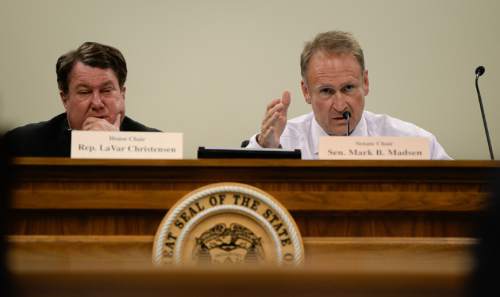This is an archived article that was published on sltrib.com in 2015, and information in the article may be outdated. It is provided only for personal research purposes and may not be reprinted.
The politics of the death penalty in the United States have always seemed a little backwards.
For the past century or more, opposition to capital punishment has been mostly a liberal thing. Even though the left in this country has generally been associated with the idea that the government exists to solve our problems, and the more government intervention the better, progressives have been anywhere from uncomfortable to downright sickened by the idea of the state putting people to death.
Much of that feeling comes from the statistically justified concern that the death penalty is more likely to be applied to members of minority groups or to those who presume to speak for the poor and downtrodden (e.g. Joe Hill), while the white, rich and well-lawyered are immune.
Support for capital punishment, over that same period, has mostly come from the conservative end of the spectrum. Which sometimes has seemed very strange indeed, given that those are the folks who, according to the stereotype, don't trust the government to do anything right.
The same political philosophy that questioned the right, or the competence, of the state to run schools, regulate markets, inspect restaurants, set speed limits or limit firearms seemed altogether sanguine with the idea that that same government should hold the literal power of life and death over individuals — and be trusted to always get it right.
But there is evidence that, as is the case with other reforms to the federal and state criminal justice systems, the left and the right are both following their thought processes to their logical ends. And winding up at the same conclusion: That capital punishment is a bad idea.
The latest, and among the most hopeful, example of that was the news the other day that Utah state Sen. Mark Madsen, chairman of the Legislature's Judiciary Interim Committee, had raised the issue of abolishing the death penalty in Utah. His interest has not yet taken the form of a bill, but it was much more than idle chatter.
Two members of the Nebraska Legislature, which recently voted to do away with capital punishment in that reliably conservative state, placed a phone call to Utah's Capitol Wednesday to discuss their evolution on the matter. It involved, as it has in so many other places, concern that no method of execution is as flawless or as humane as we might want to believe and the ever-growing number of death row inmates who have been exonerated over recent months and years.
Add to that the huge cost of carrying out a sentence of death, from trial through a long series of appeals, and the conservative case for capital punishment gets weaker and weaker.
Utah would greatly improve its system of justice, its image in the world and its claim to being a thoughtfully principled land of conservative thought if it would, once and for all, renounce capital punishment.



